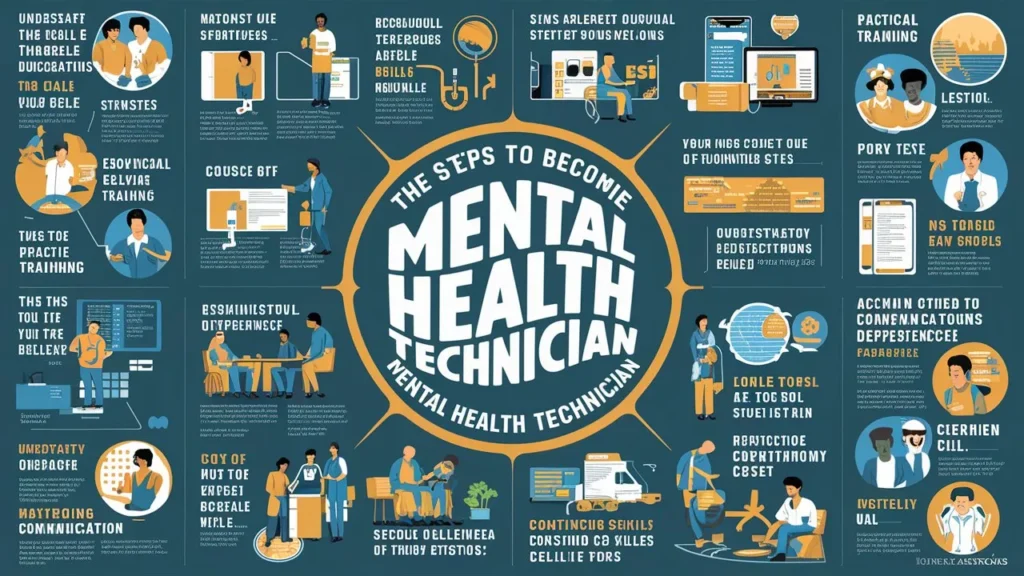
Introduction
In an increasingly complex world, the importance of mental health has become more pronounced. As a result, mental health technicians are essential in the healthcare system. They provide crucial support to both patients and healthcare professionals. This article delves into how to become a successful mental health technician, exploring the required skills, educational paths, and career progression.
Understanding the Role of a Mental Health Technician
A mental health technician plays a vital role in fortifying the mental health care system. They work under the supervision of psychologists, psychiatrists, and other healthcare professionals to help in the treatment of mental illnesses.
Typically, mental health technicians assist patients in various settings, such as hospitals, outpatient clinics, and residential treatment facilities. Their responsibilities encompass a wide range of care and support tasks that are fundamental for fostering a healing environment. In addition to their direct interactions with patients, mental health technicians often serve as a bridge between patients and the larger healthcare team, ensuring that vital information is communicated effectively and that patients feel heard and understood.
Key Responsibilities and Duties
Some of the primary responsibilities of a mental health technician include:
- Monitoring patient behavior and reporting any significant changes to the clinical staff.
- Assisting with daily living activities, such as bathing, dressing, and feeding for patients who require support.
- Engaging patients in therapeutic activities and recreational therapy to promote social skills and emotional well-being.
- Maintaining a clean and safe environment for both patients and staff.
- Documenting patient progress and interventions in their records accurately and timely.
Moreover, mental health technicians often play a crucial role in crisis intervention. They are trained to recognize signs of escalating distress and can implement de-escalation techniques to help stabilize situations before they become more severe. Their presence can make a significant difference in how patients navigate their treatment journey, providing not just physical assistance but also emotional support during difficult times.
Essential Skills and Qualities
To thrive as a mental health technician, several essential skills and personal qualities are vital:
- Empathy: Understanding patients’ feelings and perspectives is crucial for providing effective support.
- Communication: Clear communication skills are necessary for effectively interacting with patients and team members.
- Patience: The ability to remain calm and composed is important, particularly in challenging situations.
- Critical thinking: Technicians need to assess situations and think on their feet to make informed decisions.
- Teamwork: Collaborating well with healthcare professionals is essential for delivering high-quality care.
In addition to these skills, mental health technicians must also possess a strong sense of resilience. Working in mental health can be emotionally taxing, and the ability to manage one’s own stress and maintain a positive outlook is essential for both personal well-being and professional effectiveness. Continuous education and training in mental health practices, as well as self-care strategies, are often encouraged to help technicians navigate the complexities of their role while providing the best care possible to their patients.
Educational Requirements for Mental Health Technicians
While the path to becoming a mental health technician may vary, certain educational requirements typically must be fulfilled. Most positions require a combination of formal education and practical experience.
Relevant Degree Programs
Several degree programs can provide aspiring mental health technicians with a strong foundation in psychology, counseling, or social work. Commonly pursued degrees include:
- Associate Degree in Mental Health Technology
- Bachelor’s Degree in Psychology
- Bachelor’s Degree in Social Work
These programs often include both theoretical coursework and hands-on experience through internships or practicums, thereby equipping students with the necessary knowledge and skills.
Necessary Certifications and Licenses
Alongside degrees, specific certifications and licenses may be required or beneficial. Depending on the state and facility, these may include:
- Certified Mental Health Technician (CMHT)
- Registered Behavioral Technician (RBT)
Obtaining these credentials can enhance job prospects and demonstrate commitment to the field.

Steps to Becoming a Mental Health Technician
Taking actionable steps can significantly streamline the journey to entering this rewarding profession. Here are the essential steps to consider:
Gaining Relevant Experience
Practical experience is invaluable in the mental health field. Aspiring technicians should seek internships or volunteer opportunities in mental health settings. This exposure helps in understanding the daily working environment and patient interactions, bolstering both skills and confidence.
Pursuing Further Education
Further education can enhance career prospects and specialization opportunities. Consider pursuing advanced degrees or certifications in specific therapeutic practices such as cognitive behavioral therapy or trauma-informed care, which can broaden job opportunities in various healthcare settings.
Read More: Cell Signaling Technology: Revolutionizing Biomedical Research
Career Progression and Opportunities
Once established in their role, mental health technicians have various pathways for career growth. The field offers several potential career paths as individuals gain experience and further their education.
Potential Career Paths
Some career progression options include:
- Transitioning into a licensed mental health counselor after obtaining necessary degrees and licensure.
- Becoming a psychiatric technician or aide in specialized facilities.
- Pursuing roles in administration or management within mental health services.
Continuing Education and Specialization
Continuous learning is crucial in mental health. Engaging in workshops, seminars, and additional certifications can enhance knowledge and skills. Staying current with best practices and new therapeutic techniques ensures effective patient care and can provide specialization in areas like substance abuse treatment or child psychology.
Challenges and Rewards of Being a Mental Health Technician
While the role of a mental health technician encompasses numerous rewards, it is not without challenges. Understanding both the obstacles and benefits can prepare aspiring professionals for their journey.
Common Challenges Faced
Some challenges mental health technicians may encounter include:
- Dealing with aggressive or distressed patients, which can be mentally taxing.
- Working in high-stress environments, particularly during mental health crises.
- Managing emotional strain associated with patient suffering and loss.
The Rewards of Helping Others
Despite the challenges, there are profound rewards in this profession. The ability to make a tangible difference in someone’s life, to ease suffering, and to witness recovery can be incredibly fulfilling. Moreover, the sense of community with colleagues and shared commitment to patient care provides a strong sense of purpose in the role of a mental health technician.
Conclusion
Becoming a successful mental health technician requires commitment, education, skill development, and resilience. Those who choose this path contribute significantly to the well-being of individuals and the broader community, making it a career rich in both challenges and rewards.
FAQs
What is a mental health technician?
A mental health technician is a healthcare professional who works with patients experiencing mental health issues. They provide support in various settings, such as hospitals, mental health facilities, and residential treatment centers, assisting with patient care, monitoring, and therapeutic activities.
What are the primary duties of a mental health technician?
Mental health technicians are responsible for:
- Monitoring patient behavior and progress.
- Assisting with daily living activities.
- Providing emotional support and encouragement.
- Implementing treatment plans under the supervision of mental health professionals.
- Documenting patient interactions and progress.
- Ensuring a safe and therapeutic environment.
What qualifications are needed to become a mental health technician?
Typically, a mental health technician needs:
- A high school diploma or GED.
- Relevant certifications or associate degrees in mental health, psychology, or a related field.
- Some positions may require experience in a healthcare or mental health setting.
- Certification in Basic Life Support (BLS) or First Aid may be required.
What skills are important for a mental health technician?
Key skills for a mental health technician include:
- Strong communication and interpersonal skills.
- Patience and empathy.
- Ability to manage and de-escalate stressful situations.
- Attention to detail for documenting patient information.
- Understanding of mental health disorders and treatment methods.
Where do mental health technicians typically work?
Mental health technicians can work in various settings, including:
- Psychiatric hospitals and mental health clinics.
- Residential treatment centers.
- Substance abuse treatment facilities.
- Community mental health centers.
- Correctional facilities.







